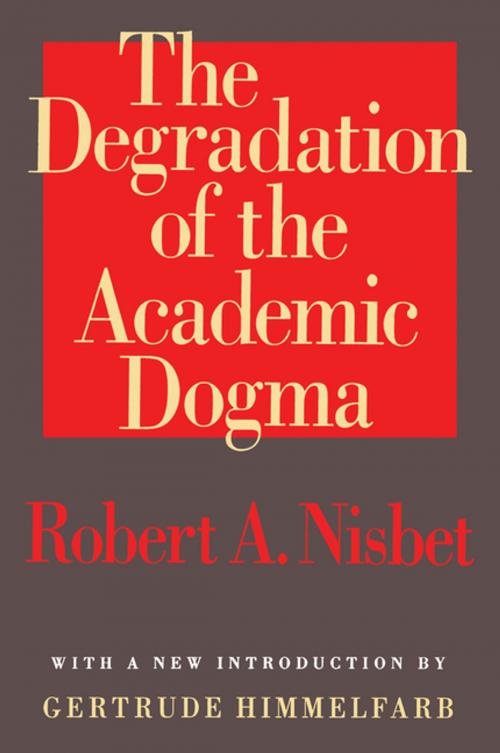The Degradation of the Academic Dogma
Nonfiction, Reference & Language, Education & Teaching, Higher Education| Author: | Egon Friedell | ISBN: | 9781351304948 |
| Publisher: | Taylor and Francis | Publication: | April 17, 2018 |
| Imprint: | Routledge | Language: | English |
| Author: | Egon Friedell |
| ISBN: | 9781351304948 |
| Publisher: | Taylor and Francis |
| Publication: | April 17, 2018 |
| Imprint: | Routledge |
| Language: | English |
This is one of the most important books ever published about the American university. Robert Nisbet accuses universities of having betrayed themselves. Over the centuries they earned the respect of society by attempting to remain faithful to what he terms "the academic dogma," the pursuit of knowledge for its own sake. The measure of a university's greatness and of the stature of an individual scholar was determined not by the immediate usefulness of the work done, but by how much it contributed to scholarship, learning, and teaching.
American universities abandoned this ideal, Nisbet charges, after World War II, welcoming onto their campuses academic entrepreneurs engaged in the "higher capitalism," the highly profitable sale of knowledge. This "reformation," says Nisbet, has resulted in the greatest change in the structure and values of the university that has occurred since their founding as guilds in the Middle Ages. And it may be responsible, for reasons he spells out in convincing detail, for their eventual demise as centers of learning.
In her introduction, Gertrude Himmelfarb pays tribute to Robert Nisbet for his prescience in analyzing the reformation of the university in the postwar period. A second reformation, she says, has further undermined the academic dogma, first by applying the principles of affirmative action and multiculturalism to the curriculum as well as to student admissions and faculty hiring, and then by "deconstructing" the disciplines, thus subverting the ideas of truth, reason, and objectivity. The Degradation of the Academic Dogma is even more pertinent today than when it was first published a quarter of a century ago. For those concerned with the integrity of the university and of intellectual life, Robert Nisbet has once again proved himself a prophet and a mentor.
This is one of the most important books ever published about the American university. Robert Nisbet accuses universities of having betrayed themselves. Over the centuries they earned the respect of society by attempting to remain faithful to what he terms "the academic dogma," the pursuit of knowledge for its own sake. The measure of a university's greatness and of the stature of an individual scholar was determined not by the immediate usefulness of the work done, but by how much it contributed to scholarship, learning, and teaching.
American universities abandoned this ideal, Nisbet charges, after World War II, welcoming onto their campuses academic entrepreneurs engaged in the "higher capitalism," the highly profitable sale of knowledge. This "reformation," says Nisbet, has resulted in the greatest change in the structure and values of the university that has occurred since their founding as guilds in the Middle Ages. And it may be responsible, for reasons he spells out in convincing detail, for their eventual demise as centers of learning.
In her introduction, Gertrude Himmelfarb pays tribute to Robert Nisbet for his prescience in analyzing the reformation of the university in the postwar period. A second reformation, she says, has further undermined the academic dogma, first by applying the principles of affirmative action and multiculturalism to the curriculum as well as to student admissions and faculty hiring, and then by "deconstructing" the disciplines, thus subverting the ideas of truth, reason, and objectivity. The Degradation of the Academic Dogma is even more pertinent today than when it was first published a quarter of a century ago. For those concerned with the integrity of the university and of intellectual life, Robert Nisbet has once again proved himself a prophet and a mentor.















